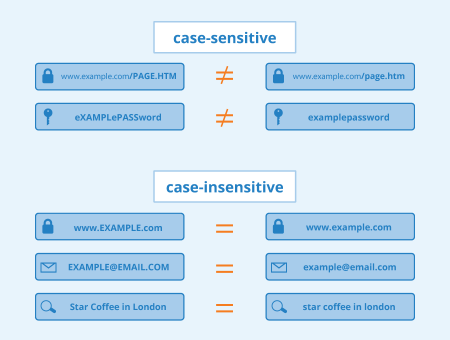Case Sensitivity
Contents
Definition

Case sensitivity is the term used to describe the ability to discriminate between uppercase and lowercase characters. Characters and letters can be deemed case-sensitive or case-insensitive through computer programming. Where case sensitivity applies, uppercase and lowercase characters are treated as different from each other and are not interchangeable. On the other hand, if a program or application is case-insensitive, whether a string of characters is uppercase or lowercase is irrelevant. In this situation, a user would be able to proceed with an online search or login procedure regardless of the type of case used.
The following examples help further clarify case sensitivity:
Example of case sensitivity:
A case-sensitive password (such as AsDfG) must be entered exactly as is for authentication purposes. Typing “asdfg” would return an invalid password message.
Example of case-insensitivity:
Typing an email address (such as [email protected]) for newsletter sign up. The email address may be entered as is or as [email protected], as it will be validated in both cases.
In the case of passwords, a case-sensitive login process allows users to create more complex credentials by combining uppercase and lowercase letters, therefore reinforcing security.
Importance for SEO
Generally speaking, case sensitivity is no ranking factor with search engines, since both keywords and Google’s search are case-insensitive. However, consistency in letter case (especially where URLs are concerned) is considered a best practice. This can help prevent duplicate content, because the Googlebot indexes lower- and uppercase URLs as different pages which could result in split ranking signals and could affect overall performance on search result pages.
Case sensitivity and search engines
Queries performed in search engines are typically case-insensitive, although there are exceptions, as explained below. For instance, searching for “marketing courses in London” would yield the same results as typing “marketing courses in london”.
Boolean searches are the exception to this, as they are case-sensitive. Boolean operators (i.e. AND / OR) must be entered in uppercase for the search engine to interpret these words as operators instead of standard words.
Case sensitivity and domains / URLs
For the most part, domains are case-insensitive, the exception being some domains that contain language-specific characters.
However, URLs that link to directories or sub-pages are usually case-sensitive, depending on how a server has been configured. For example, entering www.example.com/PAGE1.HTM in the address bar instead of www.example.com/page1.htm would return a 404 error if the file name is page1.
In summary: Case Sensitivity FAQs
What does it mean if something is case-sensitive?
Case sensitivity means that a system recognizes the difference between uppercase and lowercase letters.
What is the difference between case sensitive and case insensitive?
Case sensitive means that it matters if characters are in lower or uppercase, while case insensitive applications do not care about that.
Are search engines case sensitive?
No, search engines do not distinguish between queries in lower and uppercase. One exception are Boolean operators.
Are URLs case sensitive?
Some parts of the URL can be case sensitive, depending on a web server’s settings.
Related links
Similar articles
| About the author |
 |